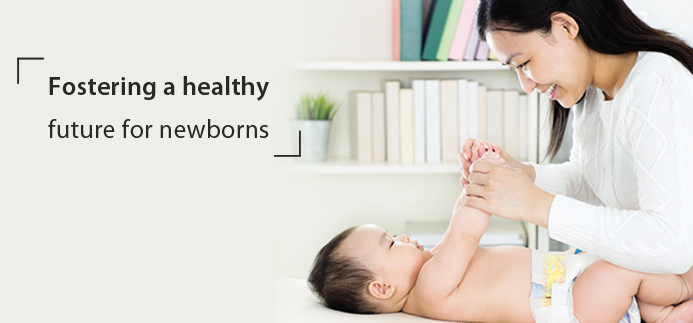1. Need for Universal New Born Screening in India
In India, an estimated 27 million babies are born every year. Various studies across the world indicate that one in every 2000 babies born has a genetic disorder at birth. In India, population studies carried out by a number of leading national centers indicate the incidence to be higher in the range of 1 for every 1500 births. Diseases like Congenital hypothyroidism, Congenital adrenal hyperplasia, Glucose 6- phosphate dehydrogenase deficiency, Phenylketonuria, to name a few, are treatable if diagnosed early at birth and the lifelong damage and disability ranging from mental retardation to physical disability can be prevented resulting in an near normal life. The lack of diagnosis and treatment results in mental stress and financial losses to parents and also to the country, which can be easily avoided.
An important sub-group of these disorders are those that can be screened and identified at birth and benefit from early intervention / treatment to prevent deterioration and lifelong disability. In the United Kingdom, 5 disorders are screened in all babies born and 5 additional disorders have been added in 2012. Other countries are more ambitious in their national screening programs with the US screening for over 50 conditions and others in Europe screening for up to 20 disorders.
The driver for such screening is not only the individual and family benefits but also the cost savings introduced by the avoidance of long term institutional care or the devastating economic impact for the families affected. It is likely that the screening program for thyroid disorders or phenylketonuria alone has saved many millions in the 40 years since screening began with many being successfully treated. This approach has been an exemplary story of modern preventive medicine.
New Born Screening is a preventive pediatric screening service provided to all newly born children to assess the possibility of genetic disorders in the area of “Inborn Errors of Metabolism”. These errors or disorders could lead to permanent neurological, cognitive, tactile and physical damage in the child, however if detected early enough can be easily treated. The treatment and care is lifelong.
2. Current Scenario:
Our neighbors, both big and small, have their own universal screening program with varied degree of coverage but with complete commitment from their respective governments. China already has a fairly advanced NBS program among the emerging economies with coverage of 80 to 85% with 4 tests being made compulsory.
Sri Lanka has a smaller program with very few disorders being screened. Countries such as Ukraine, Kazakhstan and Philippines also have fairly advanced programs. Russia has a program, which is modeled against the western program with a fairly large coverage. In India, the second largest populated country in the world, there is an urgent need to start the NBS program.
The recent ICMR survey clearly establishes the urgent need for implementing Universal New Born Screening Program across all states of India. Awareness of the need and the long term benefits to the society are not clearly understood across the country. Another major factor impeding its adoption is cost.
The incidence rates in studies are found to be significantly higher than the worldwide average; implying towards a large burden, which is completely ignored as on today. With the current annual birth levels in the country at 27 million and at an incidence level of one in 1500, the number of affected children in the country who can be diagnosed and treated is several thousand for these disorders even going by conservative estimate.
In 2007, ICMR had undertaken a pilot project (2007) at national level to determine the prevalence for 2 disorders, viz. Congenital Hypothydoidism & Congential Adrenal Hyperplasia, with a screening of 100,000 newborns free of cost from 4 zones (East, West, North & South).
A pilot newborn screening program using dried blood spots from heel prick was initiated by CDFD at Hyderabad in 1988 & 12,500 newborns were screened for Congenital hypothyroidism (CH), Congenital Adrenal Hyperplasia (CAH), Glucose-6-phospahte dehydrogenase deficiency (G-6-PD), Aminoacidopathies, etc. CH (1 in 1700) followed by CAH (1 in 2575) emerged as most common disorders.
In January 2007, the Union Territory (UT) of Chandigarh became first state or UT in India to fund mass genetic screening (NBS and prenatal diagnosis), with a reduced fee for all and free access to the poor. In February the following year, Goa became the first state to introduce mandatory NBS. Finally, in February 2009, the union cabinet was reported to have approved a proposal to establish the institute in Kalyani (West Bengal) to launch a large-scale program for NBS.
3. What is needed for a Sustainable NBS program in India?
a. Policy:
Although the issue of NBS for IEM (Inborn Errors of metabolism) is associated with Pediatrics and Neonatology, the intervention has to begin with (a) counseling pregnant mothers with the support from Obstetrician and Gynecologists and (b) education of care providers. The plan should cover children born under medical supervision in hospitals and children born in remote locations with limited assistance.
b. Availability and Affordability
The high cost of testing is a major concern.
Fortunately http://www.trivitron.com/new-born-screening.htmTrivitron, an Indian company has ventured into this field with an objective to bring down the cost and making the economics of a national universal screening program feasible by acquiring the No 2 company in the world producing NBS products based in Finland. In the process the “Make in India” objectives would be fulfilled in this highly specialized field as NBS
At the moment the products imported into India are available at the cost (to the lab) of Rs. 600-700 for a panel of four to six tests, for core panel and over Rs 2000 to Rs 5000 for Mass Spectrometry based screening. The instrumentation required for NBS program costs between Rs 25 lakhs and Rs 1.5 crores depending on the level and menu of testing. By producing these products in India through "Make in India" objective the costs of initial setup and running costs can be reduced over 50% in the initial phases. Currently the NBS testing is being done only in very few private labs and the parents pay between Rs 2000 to Rs 10,000 for the NBS tests.
[Pic Courtesy: http://medicine.nevada.edu/]







Today, I went to the beachfront with my kids. I found a sea shell and gave it to my 4 year old daughter and said “You can hear the ocean if you put this to your ear.” She placed the shell to her ear and screamed. There was a hermit crab inside and it pinched her ear. She never wants to go back! LoL I know this is completely off topic but I had to tell someone!
Un post muy informativo. Esto suena muy bien. Afrontémoslo, todos queremos tráfico en nuestros sitios web y blogs que al principio tiende a ser muy bajo. Se necesita mucho tiempo y esfuerzo para construir una presencia lo suficientemente grande en las plataformas de medios sociales para obtener tráfico regular. Esto parece ser algo que realmente ayudará a crecer y a fomentar el tráfico. Será una opción que miraré cuando haya completado más de la formación. Gracias.